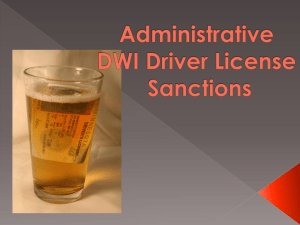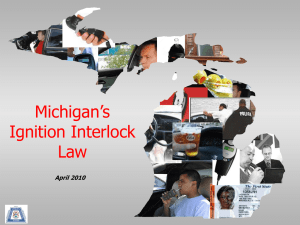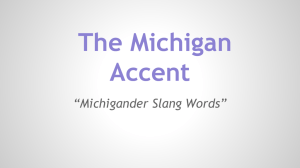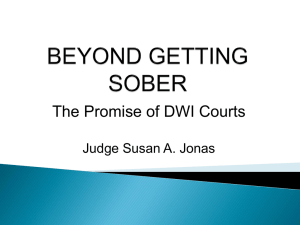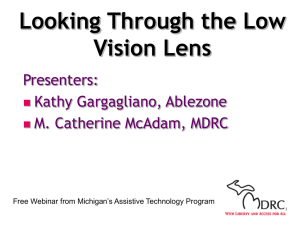Michigan`s Ignition Interlock Law - Michigan Prosecuting Attorneys
advertisement
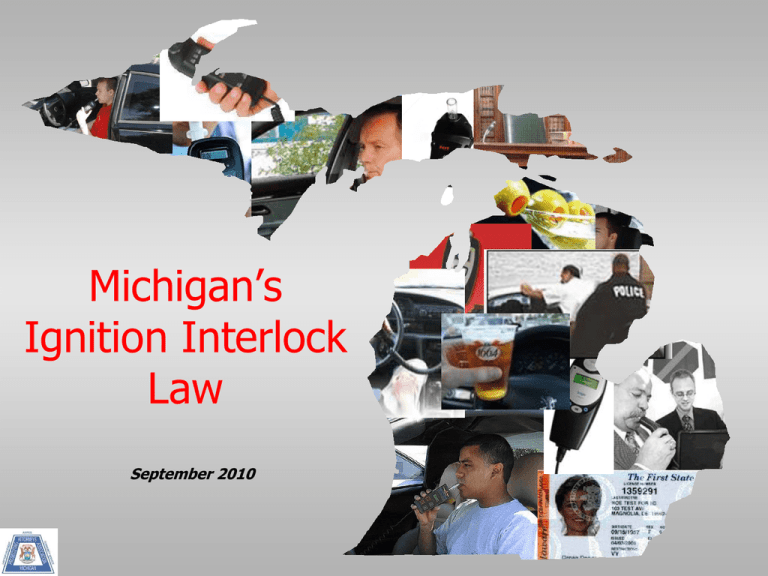
Michigan’s Ignition Interlock Law September 2010 Interlock Status-Nationwide In 2008, 142,412 interlocks in service 35% increase from June 2005 In 2008, more than 1.46 million drivers arrested for OWI Interlock penetration approximately 10% nationwide Michigan’s Ignition Interlock Law Interlock Status-Michigan ~55,000 drunk driving arrests each year ~28,000 involve a driver with a 0.15 BAC ~21,000 involve repeat offenders In 2008, 3,994 interlocks in use Only 1:8 repeat drunk drivers use an ignition interlock device Michigan’s Ignition Interlock Law Drunk Driving Concerns in Michigan 2009: 34% were alcohol related (299) 871 Fatalities In addition to the numbers of people killed by drunk drivers, many more people were injured, some who will be affected for the rest of their lives Michigan’s Ignition Interlock Law What is an Ignition Interlock? A breath alcohol measuring device that prevents a vehicle from starting if it measures a blood alcohol concentration (BAC) at .025 or above The interlock is located inside the vehicle, near the driver’s seat and mounted on the dashboard, and is connected to the engine's ignition system. It is about the size of a cell phone AKA: Breathalyzer, Interlock, BAIID Michigan’s Ignition Interlock Law How Does the Ignition Interlock Device Work? The device uses an ethanol-specific fuel cell for a sensor. The fuel cell sensor generates an electric current This current is then measured and converted to an alcohol equivalent reading Periodic calibration is performed using either a pressurized alcohol–gas mixture at a known alcohol concentration, or with an alcohol wet bath arrangement that contains a known alcohol solution Michigan’s Ignition Interlock Law Michigan’s Ignition Interlock Law Separate Drinking From Driving A breath alcohol ignition interlock device is the only available technology that separates drinking from driving Other technologies (PBTs, ankle bracelets) measure drinking behavior They do not prevent a vehicle from being started if alcohol is detected Michigan’s Ignition Interlock Law Michigan’s High BAC/Ignition Interlock Law of 2010 On January 9, 2009, Governor Jennifer Granholm signed the High BAC/Ignition Interlock bills into law; Effective, October 31, 2010, the law amends various sections of MCL 257.625: Drunk Driving Offenses License Sanctions for Drunk Driving Offenses Use of An Interlock Device Michigan’s Ignition Interlock Law “The High BAC Law” in Michigan MCL 257.625(1)(c) will prohibit operation of a vehicle if: (c) The person has an alcohol content of 0.17 grams or more per 100 milliliters of blood, per 210 liters of breath, or per 67 milliliters of urine Law only applies to first-time offenders Implied consent applies There will be 3 different “drunk driving” crimes Michigan’s Ignition Interlock Law “High BAC” Criminal Penalties Misdemeanor-maximum of 180 days $200-$700.00 in fines Up to 360 hours community service Cost of Prosecution Immobilization not exceeding 180 days allowed 6 points Michigan’s Ignition Interlock Law Mandatory Rehabilitation MCL 257.625b(5) is modified to require that courts impose mandatory rehabilitation for High BAC offenders and for repeat offenders Under the new law, alcohol rehabilitation will not be mandatory for Operating While Intoxicated-First Offense and Operating While Impaired-First Offense The programs include: …but are not limited to, an alcohol treatment program for a period of not less than 1 year. The treatment plan shall be devised from an assessment performed by an appropriately licensed alcohol assessor and approved by the court Michigan’s Ignition Interlock Law What is Prohibited Under the Act? Shall not operate a motor vehicle on which a BAIID is not properly installed (MCL 257.625l(2)) Shall not request or solicit any other person to blow into a BAIID (MCL 257.625l(3)) Shall not blow into the device for a person who has a BAIID installed (MCL 257.625l(4)) Shall not tamper with or circumvent the operation of a BAIID (MCL 257.625l(5)) Michigan’s Ignition Interlock Law Criminal Penalty for These Violations Misdemeanor punishable for up to 6 months and/or a fine of not more than $5,000.00, or both (MCL 257.625l(6)) Michigan’s Ignition Interlock Law What is Prohibited Under the Act? A person who is issued a restricted license by the SOS requiring an ignition interlock device shall not remove or cause the device to be removed unless SOS has issued an order authorizing its removal (MCL 257.322a) Michigan’s Ignition Interlock Law Criminal Penalty for This Violation Misdemeanor punishable up to 90 days and/or a fine up to $100.00 (MCL 257.322a) Michigan’s Ignition Interlock Law License Restrictions It requires the SOS to suspend the person’s license for 1 year, with restrictions permitted after 45 days. (MCL 257.319(8)(g) A restricted license shall include a condition that the person may only operate a vehicle equipped with a Breath Alcohol Ignition Interlock Device (BAIID) Michigan’s Ignition Interlock Law License Restrictions A restricted license allows limited driving privileges Generic restrictions (MCL 257.319(17)) Work School Treatment Community service Probation Serious medical Must carry proof of destination and hours Michigan’s Ignition Interlock Law License Restrictions The BAIID may be removed only when both of the following occur: The BAIID provider gives SOS “verification that the person has operated the vehicle with no instances of a BAC of.025 or higher.” MCL 257.219(8)(h) SOS issues an order authorizing removal of the BAIID. MCL 257.322a Michigan’s Ignition Interlock Law Violations of the Restrictions SOS will impose an additional period of license suspension and restriction if the person violated the conditions of the restricted license It will not apply to a start-up test failure within the first two months after the device had been installed Michigan’s Ignition Interlock Law Impoundment of the VehicleOperator is the Owner The law will provide for impoundment when a person required to have an interlock is stopped while driving a vehicle without one (MCL 257.625k(7)) The vehicle’s registration plate will be confiscated, destroyed, and thereafter, the officer will issue and place a temporary registration plate on the vehicle (MCL 257.625k(7)(a)-(d)) Michigan’s Ignition Interlock Law Impoundment of the VehicleOperator is the Owner Notify the SOS through LEIN (MCL 257.625k(7)(d)). Temporary plate valid until charges are dismissed, pleas guilty, found guilty, or is acquitted of the charge (MCL 257.625k(8)) Michigan’s Ignition Interlock Law Impoundment of the VehicleOperator Is Not Owner Law enforcement shall impound the motor vehicle by contacting a local towing agency (MCL 257.625k(9)) The owner is liable for the expenses for the storage and removal of the vehicle, and shall be returned to the owner only if the owner pays the expenses (MCL 257.625k(10)) Michigan’s Ignition Interlock Law Impoundment of the VehicleOperator Is Not Owner If redemption is not made or the vehicle is not returned, the vehicle is considered to be abandoned (MCL 257.625k(10)) No liability for the officers (MCLA 257.625k(10)) Michigan’s Ignition Interlock Law Breath Alcohol Ignition Interlock Devices (BAIIDs) SOS is required to provide a list of manufacturers of approved ignition interlocks to each person who is issued a restricted license with a BAIID condition (MCL 257.625k) Michigan’s Ignition Interlock Law Approved Ignition Interlock Device Manufacturers Smart Start, Inc.; LifeSafer Interlock; Draeger; Consumer Safety Technology; Alcohol Detection Systems These manufacturers’ ignition interlock systems effectively separate drinking from driving Michigan’s Ignition Interlock Law IGNITION INTERLOCK…. STANDARD KEY FEATURES! Anti-Circumvention Features Hum Tone/Breath Pattern- Prevents defendant from using air tank Breath Temperature- To ensure human breath sample Photo ID- So you know who is providing breath sample Running Retests- Prevents defendant from starting to drink after starting the vehicle Michigan’s Ignition Interlock Law “Running Retest” A running retest is a random, repeated breath test that a driver must continue to provide once the vehicle has been successfully started The running retest provides the driver with sufficient time to pull over at the side of the road in a safe location. At no point will the alcohol interlock shut off the engine and create a traffic hazard Michigan’s Ignition Interlock Law Downloads Downloads usually every 30-60 days Early recall feature will call the defendants in early for violations Reports sent to proper authority next day It can download more often, some courts download every 1-2 weeks Michigan’s Ignition Interlock Law Event Logs Device Records All Events: Breath Samples Engine Starts and Stops Running Retests Missed Running Retests Tampering Events Picture of Offender if using Photo Device Michigan’s Ignition Interlock Law Records the Number of Engine Starts The device keeps track of the number of times a vehicle is started Puts a “Caution” on the report for anyone with a low number “Red Flag” that an offender may be driving another vehicle Michigan’s Ignition Interlock Law Temporary Lockout Feature The device can be programmed to temporarily lockout an offender from providing a breath sample The temporary lockout feature can be used after one failed breath test or a session of failed tests This feature allows mouth alcohol time to dissipate so next breath test is clean if not consumed alcohol Michigan’s Ignition Interlock Law Early Recall Feature The device can be programmed to call an offender in prior to their scheduled appointment. This allows the court to have the information on non-compliance sooner. Can be programmed to meet each courts needs. Michigan’s Ignition Interlock Law Early Recall Feature 1. 2. 3. Programmable reasons for Early Recall: Offender is failing breath tests while trying to start their vehicle. Offender is skipping or failing running retests. Offender is tampering with or bypassing the device. Michigan’s Ignition Interlock Law Restricted Drive Times The device is programmable to only allow use of the vehicle during specified times The court would use this tool if the court did not want an offender to have access to the vehicle during high-risk times like late evenings or weekends The company can lock the vehicle’s ignition system up to 3 times in any given day Michigan’s Ignition Interlock Law Non-Compliance Feature If an offender bypasses the device, starts the vehicle after a failed breath test, or fails a running retest the device can be programmed to alarm law enforcement and/or the public The device can either honk the horn or flash the lights until a passing breath sample is given or the vehicle is shut off Michigan’s Ignition Interlock Law Common Misconception A common misconception is that interlock devices will simply turn off the engine if alcohol is detected; this would, however, create an unsafe driving situation and expose interlock manufacturers to considerable liability An interlock device cannot turn off a running vehicle, all that an interlock can do is interrupt the starter circuit and prevent the engine from starting Michigan’s Ignition Interlock Law New Technology-Photo ID Interlock Records every test for accurate positive identification Answers the question… Who took the test? Michigan’s Ignition Interlock Law When Does the Device Take a Picture? When the offender is providing the breath sample to start the vehicle When the vehicle is actually started When the offender is taking the running retests If the offender is about to miss the running retest If the offender tampers with the device Michigan’s Ignition Interlock Law Photo ID client May 2nd, 2008 09:05:37 AM 9:05:37 AM Picture Requested Test Started 9:05:50 AM Initial Test-Pass 0.000 9:05:54 AM Engine Start 9:05:55 AM Picture Requested Vehicle Started Michigan’s Ignition Interlock Law Daily PBTs The offender will have the convenience of walking outside to their vehicle to provide their PBT The court could order as many daily tests as it would like Cost effective. Cheaper than providing PBTs elsewhere and offenders save on gas & time Michigan’s Ignition Interlock Law Near Future Cellular Technology Real Time Download Alerts will be immediately sent to the monitoring authority for Failed/Skipped Breath Tests and Tampering Events as they happen Offenders will only be required to bring vehicle in every 6 months for calibration Technology could include GPS to track offenders Michigan’s Ignition Interlock Law Approximate Cost The new law increases the maximum cost to $2.00 a day for low income drivers, and for certain other lowincome drivers the installation fee will be waived. Without Camera Installation- $75.00 Daily- $2.50 Photo ID Device Installation- $100.00 Daily- $3-4 (depending on program PBT requirements) Michigan’s Ignition Interlock Law Will Ignition Interlock Devices be effective in Michigan? A study in Maryland among repeat offenders show a significant reduction in recidivism of 64% among these multiple offenders while the BAIID was in place. According to Hamilton County, Ohio, study, recidivism in DWI offenders is reduced by 65% when the ignition interlock is used on offenders’ vehicles. A number of studies have shown significant increases in the rate of recidivism following the removal of the ignition interlock from the offender’s vehicle. Michigan’s Ignition Interlock Law What are the obstacles? While common in most states, and despite its proven effectiveness and the existence of legislation and regulation: Lack of information Misinformation Urban myths and legends associated with failings of the device, although false, they become widely disseminated and never adequately addressed (i.e. Altoids or perfume cause the device to fail). Michigan’s Ignition Interlock Law Myths About First Offenders • • • • • First Offenders Drove Drunk Once Are Not Alcohol Abusers or Alcoholics Are a Negligible Part of the DWI Problem Are Less Likely to be Re-Arrested Are Not Responsible for Most DWI Fatalities Michigan’s Ignition Interlock Law 47 Myths About First Offenders • • • • • Interlocks are not cost-effective for them Interlocks are a not a fair sanction for them Interlocks are not effective for them Interlocks are too lenient, revoke them Sanctions are more important than prevention Michigan’s Ignition Interlock Law 48 First Offenders Are Not First Offenders They have driven an average of 500 times after drinking before their first arrest. R. Roth. Anonymous surveys of convicted DWI offenders at Victim Impact Panels in Santa Fe, NM Michigan’s Ignition Interlock Law 49 Michigan to Join Other States Michigan’s Ignition Interlock Law "DWI/Sobriety Courts“ Effective, January 1, 2011, the law would create a three-year project that would enable a person convicted of two or more violations of operating a vehicle while intoxicated or impaired to obtain a restricted driver license by fulfilling conditions. Michigan’s Ignition Interlock Law "DWI/Sobriety Courts“ In order for a restricted license to be issued: The person’s license would be suspended or revoked for 45 days Admittance into a sobriety court Installation of an ignition interlock device on each vehicle the driver owned or operated Michigan’s Ignition Interlock Law Benefits: The Community Allows an offender to contribute to society rather than being a burden Financial resources can be focused on other areas of need Protection to the community in that a drinking driver cannot drive a vehicle when an ignition interlock is installed Michigan’s Ignition Interlock Law Benefits: Judicial /Licensing Process Objective evaluation of behavior modification Greater confidence in actions by the offender Greater ability to fulfill responsibility to insure public safety Michigan’s Ignition Interlock Law Benefits: Defendant Keep working and earning wages Pay Legal Expenses Court Costs Reduces DWI recidivism Successful Interlock programs allow clients to earn their way off Behavioral modification Michigan’s Ignition Interlock Law Reckless Driving Causing Death MCL 257.626(4) Up to 15 years imprisonment $2,500.00-$10,000.00 fine 6 points Implied consent triggered if law enforcement officer believes alcohol or drugs involved Jury shall not be instructed on crime of moving violation causing death Counts as prior conviction for drunk driving offenses Repeal sections that prescribe penalties for felonious driving and negligent homicide Effective, October, 2010 Michigan’s Ignition Interlock Law Reckless Operation Causing Serious Impairment MCL 257.626(3) Up to 5 years imprisonment $1,000.00-$5,000.00 fine Implied consent triggered if officer believes alcohol or drugs involved Counts as prior conviction for drunk driving offenses 6 points Effective, October 31, 2010 Michigan’s Ignition Interlock Law Moving Violation Causing Death MCL 257.601d(1) Up to 1 year in jail Up to $2,000 fine Implied consent triggered if officer believes alcohol or drugs were involved Counts as prior conviction for drunk driving offenses 6 points Effective, October 31, 2010. Michigan’s Ignition Interlock Law Moving Violation Causing Serious Impairment MCL 257.601d(2) Up to 93 days in jail Up to $500.00 fine Implied consent triggered if officer believes alcohol or drugs were involved It is not a lesser included offense of reckless operation causing death Counts as prior conviction for drunk driving offenses 6 points Effective, October 31, 2010 Michigan’s Ignition Interlock Law Moving Violation Resulting in at-fault Collision MCL 257.320a(1) Civil fine increased by $25.00 (but total fine not to exceed $100.00) 4 points Effective, October 31, 2010 Michigan’s Ignition Interlock Law “Moving Violation” MCL 257.907(17) Prohibited act or omission under the Michigan Motor Vehicle Code or local ordinance that involves the operation of a motor vehicle and for which a fine may be assessed Michigan’s Ignition Interlock Law Interlocks Saving Lives The benefits are clear… You are your communities best defense in making sure our roads are safe. Everyone benefits from efforts to separate drinking from driving. Michigan’s Ignition Interlock Law Ken Stecker Traffic Safety Resource Prosecutor Prosecuting Attorneys Association of Michigan 116 West Ottawa Lansing MI 48913 (517) 334-6060 x 827 SteckerK@Michigan.gov Michigan’s Ignition Interlock Law Michigan’s Ignition Interlock Law
